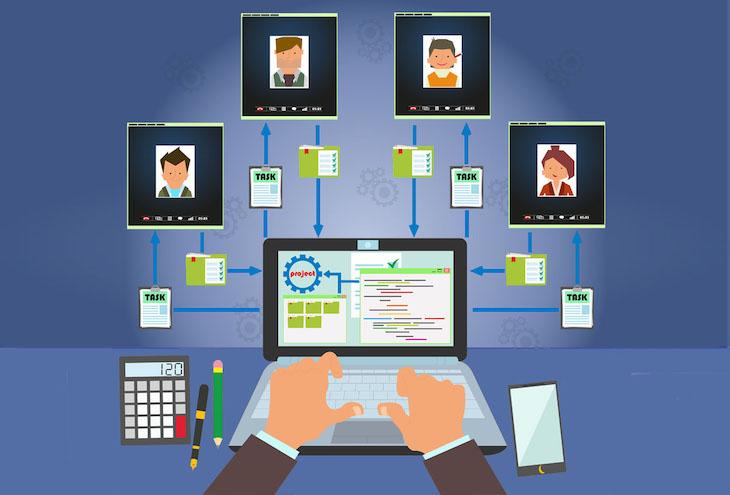Just over a year ago the world went virtual. Today, many employees are still working remotely, and will be indefinitely. It can be challenging to effectively manage employees when you don’t see them every day. But being a good manager in a virtual workplace doesn’t have to be difficult. Here are a few suggestions to help you be successful.
Set Expectations
For many, the virtual workplace looks a lot different from their traditional office. They may be working in their dining room, have children in remote school next to them, or even be in a different time zone. It’s important for managers to set expectations early. As a manager, are you OK with your employee needing to step away from a call to help their children? Do you expect your virtual team to stick to the same in-office hours? Setting expectations around what is acceptable will help your team understand what they need to do to remain effective.
Schedule Regular Meetings
One benefit of being in the office every day is face-to-face contact. While many managers can no longer simply walk down the hall to speak with their direct reports, it’s still possible to connect with your employees on a regular basis. Hold standing meetings each day, week, or month to stay in touch with your staff, provide routine, and remind everyone that they are part of a team. If possible, hold these meetings via video to provide face-to-face communication.
Use All Forms of Technology
It’s easy to fall back on email as your primary form of communication when working virtually, but it shouldn’t be your only method. Video conferencing; online chat channels like Microsoft Teams, Google Hangouts, and Slack; and phone calls are all effective ways to keep in touch with your staff. As a manager, it’s important to understand that not every employee wants to communicate in the same way. Utilizing a variety of platforms will help you connect with each employee in a way that makes them comfortable. It will also allow you to create additional lines of communication to ensure you are always able to stay in contact.
Ask How You Can Help
For many employees, the shift to a virtual workplace hasn’t been easy. Some are caring for children or elders, others are having relationship issues, and many are unaccustomed to a lack of social interaction. Good managers want to support their employees. Don’t be afraid to ask your staff what you can do to help them. Maybe they just want to talk about something besides work for a few minutes each week, or would benefit from being able to start their day 30 minutes later. You’ll never know what your team needs if you don’t ask — but if you do, your team will appreciate the support and you may learn something that will create more productive employees.
Give Your Employees a Break
Whether it’s literal or figurative, everyone needs a break now and then. It can be difficult to balance work and your personal life when working virtually, so cut your employees some slack. Give them a Friday afternoon off, or let it go when they’re 10 minutes late to a meeting because they were setting their children up in a remote classroom. Showing that you understand the challenges your staff is experiencing — and doing what you can to make things easier for them — will go a long way in helping retain your employees.
The virtual workplace has many pros and cons. To be a good manager, provide your employees with support and a variety of ways to interact. Check in with them regularly, communicate often via different channels, and ask what you can do to help. Following these tips will help your employees stay engaged, productive, and excited about their work and their team.
 On Topic
On Topic
Traci Wade, Oracle Corporation
How do you define “good manager”?
A good manager understands their team’s full potential and inspires the team to get the best out of each member. A good manager seeks feedback from the team, listens to their ideas, and learns how to better support them.
What is the biggest challenge facing managers in a remote workplace?
Building a team spirit virtually is the biggest challenge.
What is a pitfall managers should be aware of — and avoid?
Be mindful to ensure that your team does not experience burnout. Working from home, managing families, and assisting with schoolwork can all feel overwhelming. We have to remind our team to be good to themselves and take time off to recharge.
How can mangers address concerns (performance, morale, etc.) from afar?
Hosting 1:1 virtual meetings allows managers to discuss and understand the workload of individual team members and determine if there is a need to reallocate work or take on additional work. Meetings are also an opportunity to offer positive feedback or coach a team member to improve performance.
What should managers keep in mind when onboarding new reports remotely?
It is important to have high-touch engagement with new employees. Copy the team on an email welcoming the employee to help build connections early. Ask the new employee to meet with other team members to understand their roles and how they contribute to the team and the company. It’s important to have regular connection meetings to assist the new employee as they assimilate into the culture.
How do managers know if they’re succeeding in supporting their remote teams?
Ask for feedback from team members during 1:1 meetings. You can also host anonymous surveys to receive real feedback.
What is your number one tip for managers in a remote workplace?
Be open and actively listen to your team. Always remember: none of us are as good as all of us.














